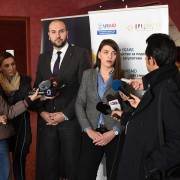Speeches Shim
USAID’s Partnership for Better Business Regulation Project hosted a panel discussion on regulations affecting the field of spatial planning, construction land, and construction works, emphasizing challenges faced by construction companies in the country.

The USAID Microfinance Inclusion and Innovation Project is a three-year, $1.4 million initiative to improve access to financial products tailored to the needs of low income households, entrepreneurs, and micro, small, and medium enterprises.

Partnership for Better Business Regulation is a four-year, $1.9 million USAID project to support small-and-medium-sized enterprises (SMEs) in North Macedonia by helping improve their ability to comply with legal requirements and participate in economic policy making. The four main chambers of commerce in the country — Economic Chamber, Macedonian Chambers of Commerce, Chamber of NorthWest Macedonia, and MASIT (the ICT Chamber) — are jointly implementing this activity with the assistance of the local consulting firm EPICENTAR International.

USAID's Readers are Leaders Project organized the second edition of its “Speech4Teach – Inspiration for Education” conference. Distinguished practicioners, writers, parents and children presented inspirational ideas on literacy and education. Among the speakers who shared their stories and ideas on education were Vesela Bogdanovikj, considered a Top 50 innovative educator worldwide, and actor Gorast Cvetkovski, who talked about his role as a parent in the digital era. The event commemorated ‘Book Month’ traditionally celebrated from October 15 – November 15 across schools in Macedonia.
Over the past several years Macedonia has introduced a number of economic reforms that have improved the country’s standing in global economic rankings. However, these reforms have not improved key economic indicators such as growth, jobs, and income, due to the frequency of the changes and the lack of consultative processes. Prior to the Eurozone financial crisis, GDP growth in Macedonia was half of its Balkan neighbors. In 2016, weak economic policy and political crisis contributed to a GDP growth rate of 2.4 percent, weak domestic consumption remains weak as incomes stagnate. While the unemployment rate fell to 23.1 percent, most new jobs are created with government subsidies. Entrepreneurship and workforce skills are not keeping pace with the evolving market which further inhibits growth. Although Macedonia is attracting foreign investments to its Technological and Industrial Development Zones, the overall investment level outside these zones remains low and private sector lending is not meeting demand.

Comment
Make a general inquiry or suggest an improvement.